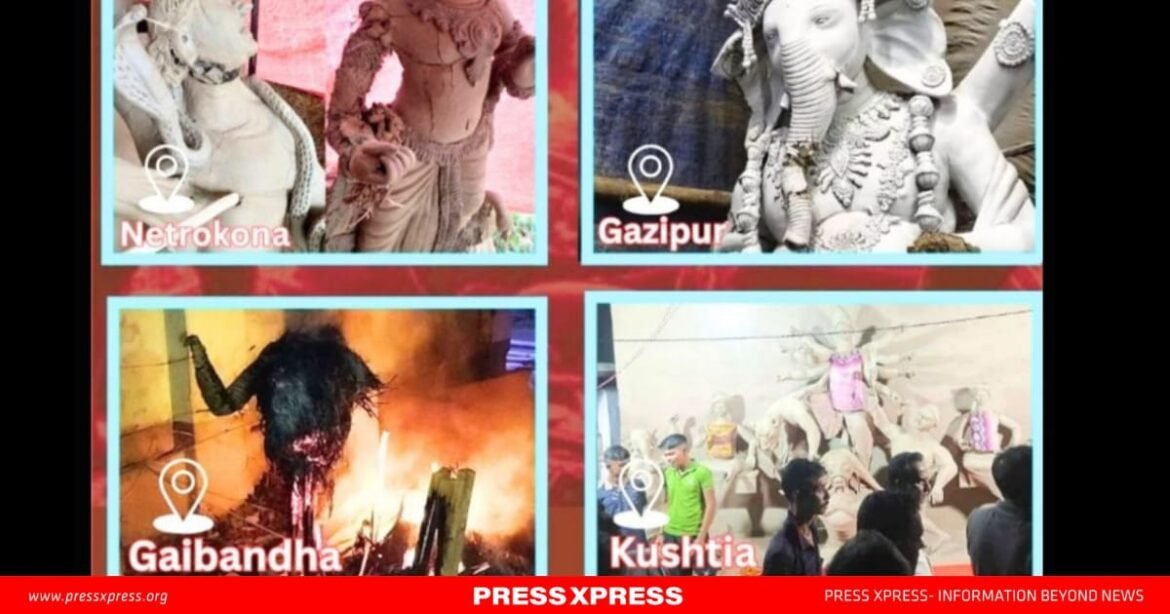As the Sharadiya Durga Puja festival draws near, a disturbing wave of violence has emerged across Bangladesh, tainting what should be a joyous occasion for Hindus. Radical elements, including extremist Muslim factions, have launched coordinated attacks on temples, puja pavilions, and Durga idols in several districts, shaking the very foundation of communal peace in the nation.
In the past few days, there have been multiple reports of vandalism and looting in the districts of Gaibandha, Kushtia, Netrokona, and Gazipur. These attacks, which have involved desecrating Hindu idols and torching puja venues, are seen by many as a deliberate assault not only on religious practices but on the fragile fabric of Bangladesh’s communal harmony. As Durga Puja is the largest religious festival for Hindus in Bangladesh, such acts serve as a chilling reminder of the growing influence of radical Islam in the country.
The escalating violence has sparked outrage among civil rights groups and activists, who argue that the attacks represent a systematic effort to undermine religious freedom and stir sectarian discord. Behind these acts of violence lies a calculated conspiracy, executed by fundamentalist elements with a clear agenda to destabilize the nation and challenge the rights of minority communities. What is particularly alarming is the complete lack of action from the authorities to curb this violence. Despite numerous incidents in the past, the government’s response has been tepid at best, emboldening the perpetrators and leaving Hindus vulnerable during their most sacred festival.
A Growing Threat to Religious Tolerance
This recent string of vandalism is more than just an isolated law-and-order issue. It signals a deeply ingrained attempt to disrupt the religious and cultural identity of the nation. The administration’s failure to provide adequate security for religious minorities is raising serious questions about its commitment to upholding Bangladesh’s secular ideals and its obligation to protect all of its citizens.
Activists have called for the immediate removal of Home Adviser Lt. Gen. (Retd) Jahangir Alam Chowdhury, who has come under intense scrutiny for his insensitive comments about Durga Puja, linking the festival with alcohol and marijuana. His statements, which have widely been perceived as offensive and divisive, further expose the dangerous undercurrents of communalism that are taking root in Bangladesh’s political landscape.
Moreover, many point to the Yunus regime’s dismissive stance on communal violence, with the administration denying allegations of targeted attacks on minorities and accusing critics of exaggerating the situation. This denialism has further eroded the trust of the Hindu community, which now finds itself increasingly insecure and isolated.
An Emerging Blueprint of Extremism
Reports from the Bangladesh Hindu Bouddha Christian Oikya Parishad (BHBCOP) and the Minority Unity Front have documented over 2,400 incidents of violence against religious minorities within just ten months, including numerous attacks on temples, businesses, and homes. The frequency and severity of these attacks have raised concerns about a coordinated effort to drive minorities out of certain areas. Radical Islamic groups, such as Touhidi Janata, Jamaat-e-Islami, Hefazat-e-Islam, and other jihadist factions, have been accused of actively inciting violence, with some even receiving support from militant groups in neighboring India and Myanmar.
Sources suggest that jihadists are planning more organized and widespread attacks during the upcoming Durga Puja celebrations, scheduled to begin on September 28. These groups are reportedly planning to infiltrate puja pavilions disguised as police officers to incite violence while the real authorities stand by or, in some cases, support the attacks. The involvement of Bangladeshi jihadist groups with Pakistani militants, such as Lashkar-e-Tayyiba (LeT) and Tehrik-e-Taliban Pakistan (TTP), has raised alarms that these attacks are part of a broader, transnational agenda aimed at destabilizing the region.
The collaboration between Bangladeshi jihadists and Pakistani militants is especially concerning, with reports indicating that suicide bombers are being trained along the Bangladesh-India border, particularly in the Chittagong Hill Tracts. These operatives are being groomed for attacks not only in Bangladesh but also in India’s West Bengal and the Seven Sisters region. This international link between Bangladeshi extremists and Pakistan-based terror groups suggests that the attacks on Durga Puja are part of a larger effort to stoke sectarian violence and create a flashpoint for regional instability.
A Call for Strong Action
In light of these growing threats, it is imperative that the administration take immediate and decisive action to ensure the safety and security of religious minorities in Bangladesh. The government must not only act to prevent attacks on religious sites but must also hold those responsible for inciting and carrying out these acts accountable. The failure to address the roots of religious intolerance will only fuel further violence, jeopardizing Bangladesh’s reputation as a diverse and tolerant nation.
Moreover, the international community must closely monitor the situation, particularly in light of the ongoing collaboration between Bangladeshi extremists and foreign militants. As the world prepares for the Durga Puja festivities, it is vital that the global community stands in solidarity with the people of Bangladesh in defending religious freedoms and promoting peace.
If the violence continues unchecked, the country risks descending into deeper divisions, with minorities increasingly feeling unsafe in their own homes. The attacks on Durga idols and puja pavilions are not just an assault on religious practices; they are a direct attack on the soul of Bangladesh itself. Now, more than ever, it is crucial for the people and the government to stand united in the face of extremism and preserve the country’s legacy of religious harmony.


